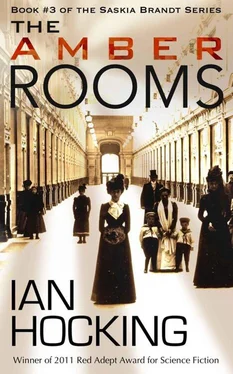A foreign thought stepped into her mind. It could only have come from the i-Core. She saw two birds in flight against the dawn. The second bird was injured but had enough strength to travel in the slipstream of the first.
No. That is mine. This is me.
The injured bird fell.
By the afternoon of the following day, Saskia had completed the ten-hour journey to Monte Carlo, where she finessed her plan while drinking an espresso in Le Café de Paris, which overlooked much of Monte Carlo and abutted the Hôtel du Paris and the casino. Her right arm had fully healed. Her amputation remained just that.
She had spent the Count’s money—intended for bribes and other disbursements—in a waterfront boutique. She had even bought a postcard for Yusha, but she had not posted it. Did he think she was dead? It would be better that he did.
Now, over this perfect coffee, she watched cooling, autumn Monaco. It made her think of St Petersburg, where less was not more. Her eyes moved again to the casino: a fortress of competing architectural styles; hierarchical; symmetrical; ripe.
Yes, St Petersburg. She longed for it, too.
~
‘And two teaspoons of Maraschino.’ Her voice was raised to be heard over the crowd in the casino. ‘Very good thus. Do not shake the glass! Let each cordial show its own place.’ A nod with half her head. ‘That, my clumsy friend, is a pousse-café .’
‘May I try it, Mademoiselle Carrault?’
She made a winding gesture with her fingers. The waiter—well spoken, pretty, likely a prostitute—took a metal cup from beneath the glass bar and poured some of the cocktail into it. He sipped.
‘Good?’ she said.
The waiter looked embarrassed. Saskia laughed. Her delight was in character but true.
‘It grows on you,’ she said.
‘Yes, it does.’
‘Well, sayonara .’ She hated this word, but its use was common among the clique within which her fictional self—a bored French straycat, likely rude, certainly idle—found a dull but tolerable existence.
‘Good luck, Mademoiselle,’ he said. There was innocence in his smile. She hoped he kept it.
Saskia turned to the floor of the casino. It held more than two hundred people. The stations were busy and the costumes colourful. White nebulae of tobacco smoke hung around the chandeliers. That cliché of the shuttered windows held: to deny the day when it came. In a glance, Saskia noted the games being played. The most popular, by table, was Baccarat Chemin de Fer. That was good.
She stayed at the bar and sipped her pousse-café as she noted the clockwork of the casino employees. In fifteen minutes, she had them all. There were two hosts. They stood on the gallery to enjoy an elevated view. Each took one half of the room. Next, she looked for the sweepers, those men who walked the casino floors. There were three.
She moved her attention to the blackjack tables. The nearest, beneath one of the chandeliers, had only two of its six bases free. The dealer used a shoe, not a free deck. This annoyed her because it would be harder to predict the fall of the dealer’s hand, unless she could calculate the number of decks in use.
An elegant man rose from the nearest blackjack table. Either he had placed a large bet, or he was about to give up. He coughed into his fist and scanned the faces of those around him as he walked away. Saskia took the opportunity to replace him, gliding at a speed just short of unladylike.
The two players at the remaining two bases stood as she joined the table. She acknowledged this with a slow blink.
‘Mademoiselle Carrault,’ Saskia said.
‘Goodrington,’ said the first. ‘This is Barnes.’
‘Let me guess,’ she said, in French, ‘you’re alpinists.’
‘Alpinists!’ said the first. ‘We are’—he leaned over his gin and tonic—‘alpinists!’
‘I know this already,’ she said, shaking their hands, ‘because you are two of the loudest and most drunk people in the house.’
Goodrington nodded. He stared at her. The tip of his nose made small circles. He said, ‘Alpinists!’
‘You charm me.’ This time, she spoke English, in part because it was the language of Shakespeare and she loved the pebble-smooth edges of its sounds. Also, she already disliked the role she had cast for herself. Mademoiselle Carrault was rude and spoiled: a trifle par for this course.
The flattering mirror behind the dealer reflected her art nouveau ball gown. It had been worth the money: unweighted silk, a lavender-coloured lace over the pigeon chest and throat; the black buttons on the arm-length sleeves; the prominent waist sash. Only her handwarmer marked her as eccentric. Within it, her right hand worried the stack of chips.
‘You will oblige me,’ she said to the dealer, who was an old gentleman with a Grenadier’s moustache, ‘with a reprisal of the house variation.’
‘Of course, Mademoiselle,’ he said. He also spoke in English, no doubt in a vain attempt to reinforce the rules to the alpinists, who had made little effort to observe them thus far. ‘A higher hand than my own will pay at a ratio of three-to-two. Late surrender is permissible. I win ties. I do not receive a hole card. Finally, I am required to stand on seventeen and draw to sixteen.’
‘Very well,’ she said.
Goodrington announced, ‘Very well,’ to the room at large.
Looking up from the open platform at the rear of first class, as her train departed, it seemed to Saskia that the iron hood of Monaco’s only railway station did not move. This made her think about a private docent at the University of Berne, who had a theory about special relativity, and she smiled. The journey to Russia would take five days. Nine hours to Zurich, then three to Stuttgart, a short hop to Mannheim, then two days from Wjasma to Moscow, followed by a last five-hour leg to St Petersburg.
She needed St Petersburg more than ever. Elegant European bones around Russian marrow. St Petersburg was the way back. In 2023, her womanhood would decompress to something greater and less suffocating. And there was David Proctor. Her friend needed her. It was not likely that she could prevent his death, nor stop the crippling madness of his daughter, but neither were these eventualities inevitable. There was uncertainty enough to try, and to care, and to help.
As the future pulled, the past pushed: the ubiquitous city smells of smoke, human excrement and foul water; the disease and the pain commonplace; the slow blackening of houses, trees, faces. Underlying it all was the talk in the coffee houses that Europe had climbed to a high pass during the nineteenth century that would open onto the glorious vista of the twentieth.
Alone, she considered Mont Agel. The wind grew as she stood on the rocking platform. She was obliged to steady her hat with a lace-gloved hand.
‘“Know for certain that once”,’ said a voice that made Saskia’s stomach muscles tighten, ‘“struck down to the ground, an oppressed man strives again to reach the pure mountain when exalted by hope.”’
She turned.
He was a fraction shorter than her and splendidly dressed. Like all illegals, he had selected his costume ad libitum from the fancy dress shop of the Tsar’s imperial forces. Today he was a naval officer with a white, peaked cap and gold shoulder-boards. His moustaches and beard had bloomed since their last meeting, but his left eye was still bloodshot where it had been maimed by a homemade “apple” bomb shortly before the robbery in Tiflis.
He was holding a knife in a reverse grip. Its point stopped at the base of her ribs, where it was ready to breach the whalebone. Kamo looked at her with the expression of a man gorging on her appearance. His eyes zigzagged over her forehead, lingered at her throat, her breasts, and her shoes. There he stopped. The psychiatrists of Saskia’s time would have many words for him. This time had only one—Kamo.
Читать дальше












